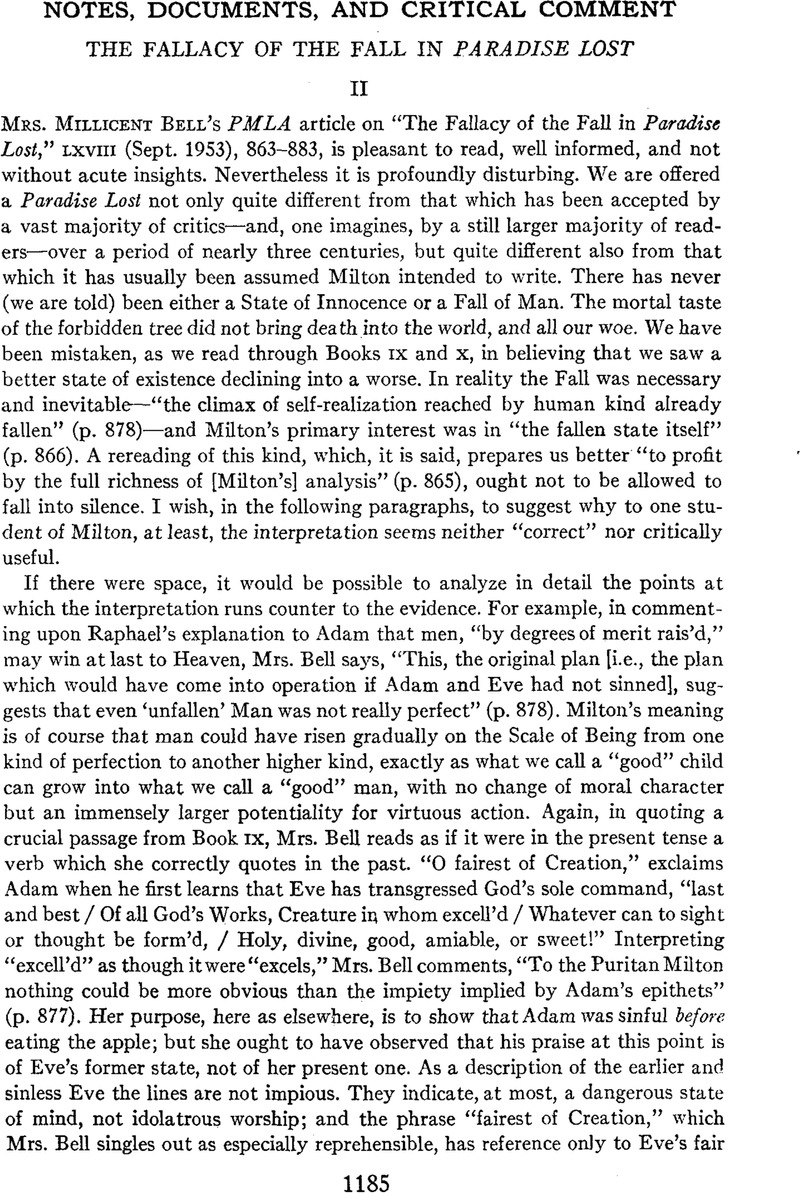Article contents
The Fallacy of the Fall in Paradise Lost
Published online by Cambridge University Press: 02 December 2020
Abstract

Information
- Type
- Notes, Documents, and Critical Comment
- Information
- Copyright
- Copyright © Modern Language Association of America, 1955
References
page 1188 note 1 I have just read a highly interesting discussion by Arnold Stein (Answerable Style, Univ. of Minn., 1953) in which the close following of Milton's language has yielded some of the results I have in mind. In his chapter titled “The Fall,” pp. 75–119, Mr. Stein offers some particularly pertinent observations.
page 1188 note 2 Some of the recent studies which have touched upon the matter are: Douglas Bush, Paradise Lost in Our Time (Ithaca, N.Y., 1945); John S. Diekhoff, Milton's Paradise Lost (New York, 1946); A. J. A. Waldock, Paradise Lost and Its Critics (Cambridge, 1947); Paul Turner, “Woman and the Fall of Man,” English Studies, xxix (1948), 1–18. My own pursuit of the problem was particularly stimulated by E. M. W. Tillyard's essay, “The Crisis of Paradise Lost,” in his Studies in Milton (London, 1951). I have just received a monograph issued in the Upsala Essays and Studies (1953), “The Central Problem of Paradise Lost: The Fall of Man,” by E. L. Marilla, which also brings similar observations forward in an interesting manner.
page 1188 note 3 With Waldock's principal thesis, that Adam fell through “true love,” and that Milton secretly sympathized with him, I do not agree. Turner's English Studies article is an effective reply.
page 1188 note 4 The Common Pursuit (London, 1952), p. 24.
page 1188 note 6 Cf. Watson Kirkconnell, The Celestial Cycle (Toronto, 1952), whose “descriptive catalogue” lists over 300 analogues to Paradise Lost.
page 1188 note 11 Nathaniel Hawthorne, “Earth's Holocaust,” Mosses from an OU Manse.
page 1188 note 7 Basic Writings of Saint Augustine (New York, 1948), ii, 257–259.
page 1188 note 8 Reformed Dogmatics, ed. Ernest Bizer, trans. G. T. Thomson (London, 1950), pp. 249–250.
page 1188 * The course of the discussion has prevented me from acknowledging, as I would like to do, that the behavior of the Parents before the fall is highly significant in relation to the fall. In Books iv, v, and viii, and in the early part of Book ix, Milton takes pains to show readers which of the Parents' unfallen impulses are potentially most dangerous. There is accordingly no dispute between Mrs. Bell and me about the importance of Books i–ix (or again of Books x-xii), but only about ethical judgments which have important bearings on the poem's total meaning.
I wonder whether any purpose would be served by adding that I share Mrs. Bell's admiration of Arnold Stein's recent discussion of the fall in Answerable Style (Minneapolis, 1953, pp. 75–118)? In fact, I am willing to settle the matter on Stein's terms, which justify Mrs. Bell's special interest in the states of mind portrayed in Books iv-ix but do not force an interpretation of the fall different from that intended by Milton.
- 2
- Cited by

